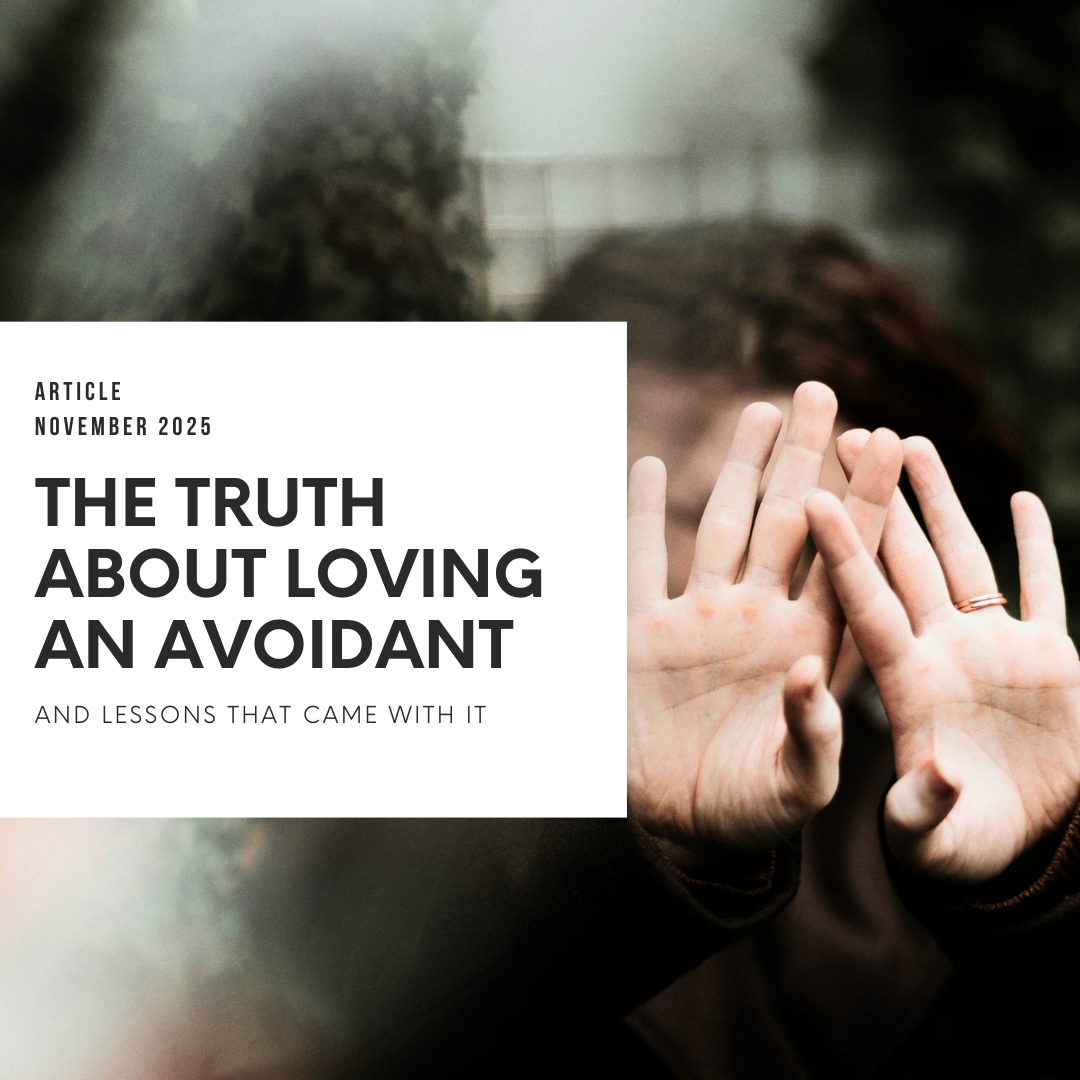November 16th, 2025
The Truth About Loving an Avoidant
There’s a specific kind of heartbreak that comes from loving an avoidant.
The heartbreak that comes from loving someone who keeps running.
Not from you — but from themselves.
Everything feels good until it doesn’t.
The connection is real, the potential is obvious, and then conflict hits —
and suddenly all the closeness disappears.
You’re left replaying every moment, trying to figure out what you did wrong.
Trying to make sense of something that never should’ve been yours to carry.
Here’s what I’ve learned through that kind of love:
you can’t build something real with someone who is terrified of their own truth.
Because when life hands them a mirror, they don’t lean in — they disappear.
You can love them.
You can understand them.
You can hold compassion for where they are.
But you can’t do the emotional work for them.
And learning to love someone like that — without abandoning yourself — will teach you everything about power, boundaries, and self-worth.
The 4 Lessons I Learned From Loving an Avoidant
1. Boundaries Protect Connection
When you don’t hold your boundaries, people will unknowingly cross them.
Not out of malice — out of habit.
And someone who struggles with closeness will take any space you don’t claim.
It’s harder to stop a pattern than to set a standard early.
Boundaries aren’t punishment —
they’re clarity, safety, and respect.
They’re how you teach people how to treat you.
2. Your Feelings Are Still Valid
When someone you care about can’t hold your perspective, it can make you question your reality.
You start to doubt what you felt, what you saw, what you know.
You start wondering if you’re too much, too emotional, too intense.
Your feelings are data.
Your experience is real.
Just because they can’t hold it doesn’t mean it isn’t true.
You don’t need someone else’s agreement to validate what you lived.
3. Their Capacity Has Nothing to Do With Your Worth
This one cut the deepest.
For a long time, I believed:
If they loved me enough, they’d stay.
But capacity isn’t about love —
it’s about readiness, history, nervous system wiring, and emotional skill.
Their ability to show up, repair, and stay has nothing to do with your value.
You can love someone deeply and still accept that they’re not equipped to meet you.
That’s not failure —
that’s truth.
4. Labels Make Us Blind — Understanding Makes Us Human
When the relationship got confusing, calling him “avoidant” helped me feel like I had something to hold onto.
The label made the chaos make sense.
It gave the pain a name.
But here’s the part I didn’t see at first:
the label was keeping me stuck.
Because labels do three things:
- they judge instead of understand
- they flatten someone into a 2D version of themselves
- and they oversimplify the solution — “Just stop avoiding already.”
But avoidance isn’t a personality flaw.
It’s a protective strategy.
And underneath it is usually something very human:
- fear of intimacy
- fear of abandonment
- fear of rejection
When I saw that, he stopped being “the avoidant.”
He became a person doing the best he could with the tools he had.
And when I stopped fixating on his patterns,
I finally saw my own.
- My own fear of intimacy.
- My own fear of abandonment.
- My own fear of rejection.
We weren’t opposites.
We were mirrors.
Two people with different strategies, same fears.
And once you see that, the story stops being about “loving and avoidant” or about who’s right or wrong — and starts being about what needs healing.
Loving someone who keeps running teaches you a truth you don’t forget:
you can understand someone’s pain without abandoning your own.
And once you learn that, you stop chasing,
start choosing,
and everything changes.
If you’re tired of repeating the same relationship cycles, tired of guessing what went wrong, and tired of carrying it alone…
There is a way out — but it starts with understanding your patterns.
👉 Book a free clarity call and let’s uncover what’s really going on.


